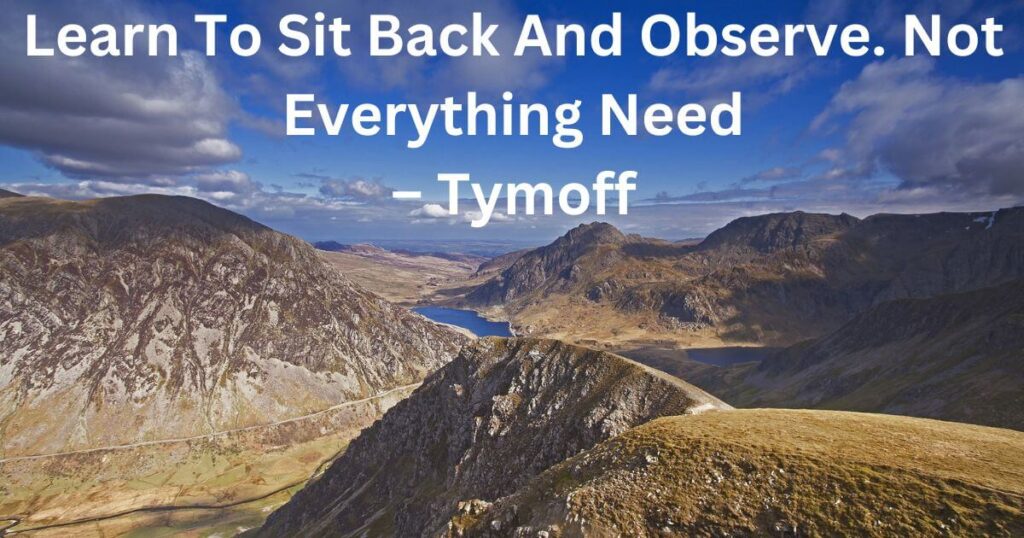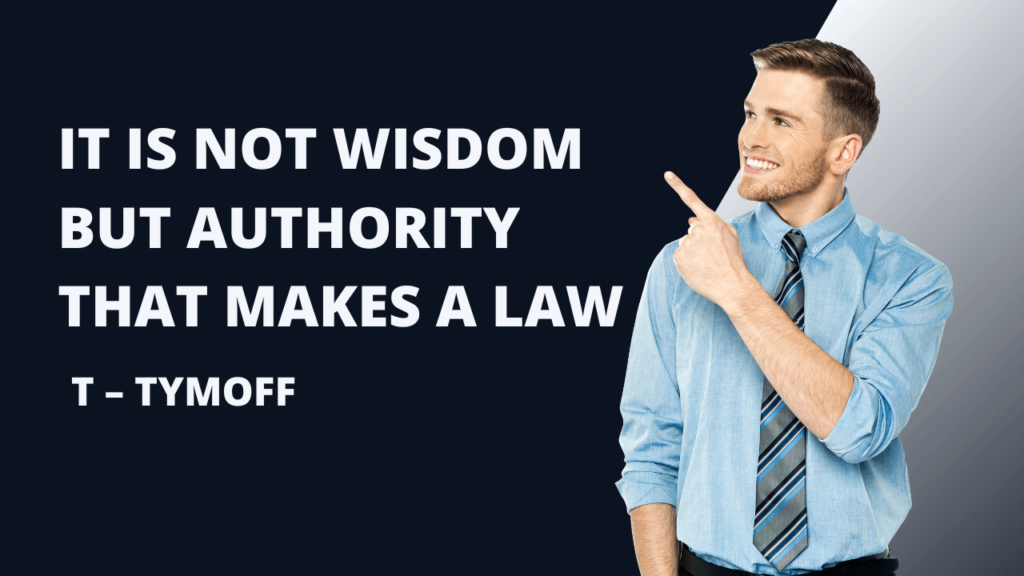In today’s fast-paced world, where information overload and constant connectivity are the norms, the ability to pause and reflect has never been more crucial. The phrase “learn to sit back and observe. not everything need – tymoff” encapsulates an essential philosophy for achieving mental clarity and emotional balance. By mastering the art of patience and observation, we can cultivate a more thoughtful approach to life, enabling us to make better decisions, reduce stress, and foster a more peaceful state of mind.
Understanding the Importance of Observation
The Nature of Human Response
Humans are inherently reactive beings. Our instincts often drive us to respond immediately to stimuli, whether it be an emotional situation, a work-related challenge, or social media notifications. However, this instinctual reaction can lead to impulsive decisions and regrettable consequences. When we “learn to sit back and observe,” we allow ourselves the opportunity to step away from automatic responses and engage in a more reflective process.
The Benefits of Observation
- Enhanced Decision-Making: Taking time to observe before reacting enables us to assess situations more comprehensively. It allows us to gather information, consider different perspectives, and weigh our options carefully. This thoughtful approach leads to more informed decisions.
- Emotional Regulation: Immediate reactions are often driven by intense emotions. By learning to sit back, we create a buffer between stimulus and response, giving ourselves time to process our feelings. This can lead to a more measured and composed reaction, reducing the likelihood of emotional outbursts.
- Stress Reduction: The pressure to respond immediately can be overwhelming. By adopting a more patient mindset, we can alleviate the stress associated with urgent decision-making. This approach fosters a sense of calm and control in our lives.
- Improved Relationships: Observation encourages active listening and empathy. When we take the time to understand others’ perspectives, we cultivate deeper connections and healthier relationships. This is particularly important in conflict situations, where rushing to judgment can exacerbate tensions.
The Philosophy of Taking Time Off

The Concept of “Tymoff”
The term “tymoff” refers to taking time off—a deliberate pause to reflect and recharge. In our modern society, where hustle culture is glorified, the idea of stepping back can feel counterintuitive. However, taking time off is essential for personal growth and well-being.
Why Time Off Matters
- Rejuvenation: Constant work without breaks leads to burnout. Taking time off allows our minds and bodies to rejuvenate. This renewal is vital for maintaining productivity and creativity in the long run.
- Clarity and Focus: Stepping away from daily responsibilities provides clarity. It gives us the space to think deeply about our goals, aspirations, and the direction of our lives. This clarity enhances our focus and commitment when we return.
- Perspective Shift: Distance from routine tasks can shift our perspective. What seemed like pressing issues may appear less significant from a broader viewpoint. This change in perspective can lead to innovative solutions and a more balanced approach to challenges.
- Personal Reflection: Time off creates opportunities for introspection. We can reflect on our experiences, evaluate our choices, and learn from our successes and failures. This self-awareness fosters personal growth and enhances our decision-making capabilities.
Practical Ways to Incorporate Observation and Time Off
Mindfulness Practices
- Meditation: Regular meditation practice helps train the mind to focus and observe without judgment. Even a few minutes each day can cultivate a greater sense of awareness and calm.
- Nature Walks: Spending time in nature allows us to connect with our surroundings and observe the world without distractions. This practice encourages mindfulness and helps us appreciate the present moment.
- Journaling: Writing down thoughts and experiences can be a powerful form of observation. It helps clarify our thoughts and feelings, making it easier to process and understand our reactions to different situations.
- Digital Detox: Taking breaks from technology allows us to disengage from constant notifications and distractions. This digital detox fosters deeper connections with ourselves and others, promoting observation and reflection.
Setting Boundaries
- Prioritizing Downtime: Make a conscious effort to schedule regular downtime in your life. Whether it’s a weekend retreat or a daily break, prioritizing time off is essential for mental health.
- Learning to Say No: It’s okay to decline invitations or requests that don’t align with your priorities. Saying no frees up time for reflection and observation.
- Creating a Routine: Establishing a daily routine that includes time for observation and self-reflection can enhance overall well-being. Set aside specific times each day for meditation, journaling, or simply being present with your thoughts.
Cultivating Patience
- Breathing Techniques: Simple breathing exercises can help ground us in the present moment. When faced with a challenging situation, take a few deep breaths before responding.
- Pause Before Reacting: Train yourself to pause before responding to any situation, whether it’s a conversation or a work-related email. This brief pause can lead to more thoughtful responses.
- Practice Gratitude: Cultivating an attitude of gratitude encourages a positive mindset. When we focus on what we appreciate, it becomes easier to observe without immediate reaction.
The Long-Term Impact of Observation and Time Off
A More Peaceful State of Mind
Incorporating the principles of observation and taking time off into our daily lives can lead to a more peaceful state of mind. This tranquility allows us to navigate life’s challenges with grace and composure. Instead of reacting impulsively, we can respond thoughtfully, creating a ripple effect of calm in our interactions with others.
Better Relationships
As we practice observation and patience, we cultivate better relationships with those around us. The ability to listen and understand others enhances communication, reduces conflict, and fosters deeper connections. This shift in dynamics leads to a more harmonious environment, both at home and in the workplace.
Improved Productivity
When we take time off to recharge and reflect, we often return with renewed energy and focus. This improved productivity stems from a clearer mind and a more thoughtful approach to tasks. As a result, we can achieve more in less time, reducing the pressure to constantly perform.
Greater Self-Awareness
Observation fosters self-awareness. By taking the time to reflect on our thoughts and actions, we gain insight into our motivations and behaviors. This self-awareness allows for personal growth and the opportunity to make conscious changes in our lives.

Conclusion
In a world that often glorifies speed and constant activity, the philosophy of “learn to sit back and observe. not everything need – tymoff” serves as a powerful reminder of the importance of patience and reflection. By taking time off and cultivating the art of observation, we can navigate life with greater clarity, emotional balance, and peace. As we embrace this philosophy, we pave the way for a more fulfilling and meaningful existence, one that values thoughtfulness over impulsiveness and fosters a deeper connection with ourselves and others.
In summary, adopting a mindful approach to life allows us to thrive in an increasingly chaotic world. So, take a moment to pause, reflect, and observe—the benefits will resonate through every aspect of your life.
